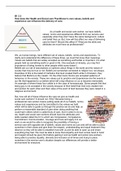B1 2.3
How does the Health and Social care Practitioner’s own values, beliefs and
experience can influence the delivery of care.
As a health and social care worker, we have beliefs,
values, norms and experiences different from our service user
especially when they don’t have the same background, culture
and belief than us. But, how will this affect our way of delivering
care for them? Should this affect it? What are the skills and
attributes we must have as professionals?
We, as human beings, have different set of values, beliefs, norms and experiences. To
clarify and understand the difference of these three, we must first know their meanings.
Values are beliefs that are widely accepted as something worthwhile or important. It is what
people held as something worth or good in life. One example is Honesty, you may find
importance of being honest to other people while some doesn’t.
Beliefs are our set of assumptions or opinions about things in the world and the nature of
society that may be true or not. Beliefs are somewhat connected to religion but, not always.
Examples of this is the belief of Catholics that God created Earth while in Hinduism, they
believe that Brahma is the creator. On the other hand, Norms are accepted patterns of
behaviour in the society. These are values put to practice and Experiences are the events in
our life that happened to us before which left a big influence on us or became memorable.
An example of where these four collide is in the case of homosexuals. Some people find that
being gay is not accepted in the society because of their belief that God only created men
and women for each other and their value of the word of God because they were raised in a
religious environment.
But, how will all of these influence the care we give as health and
social care workers? It should not. Why? Because being a
professional care worker means putting aside all of our beliefs, norms,
values and experiences and be committed to the values we hold
which will be able to guide us through the practice we do and help us
perform a reasonable standard of care when doing anything that
could harm others which is called Duty of care. And in order to do so,
we, health and social care workers should have the attributes and
skills needed called the 6 C’s which are Compassion, Competence,
Commitment, Communication, Courage and Care and apply it to our
work so we would be able to recognise the possibility of having a
service user with opposite set of beliefs, values and norms as ours and still be able to place
ourselves in their shoes and give them the respect, understanding and equal treatment they
deserve so they will be able to establish trust with us and be able to open up and share
everything they feel. We must be able to know that empathy and trust comes hand in hand
and respect should be given first before gaining it and as health and social care workers,
being able to practice equality, diversity and inclusion at all times and trying to place
ourselves in the service user’s situation despite our differences will provide a better
environment for everyone.




